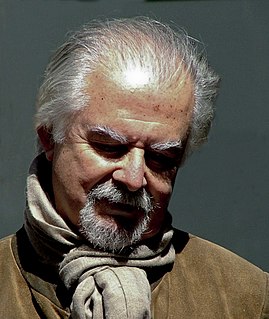A Quote by Bill Bryson
It is a slightly arresting notion that if you were to pick yourself apart with tweezers, one atom at a time, you would produce a mound of fine atomic dust, none of which had ever been alive but all of which had once been you.
Related Quotes
But they had, perversely, been living among people who were peering into the wrong end of the telescope, or something, and who had convinced themselves that the opposite was true - that the world had once been a splendid, orderly place...and that everything had been slowly, relentlessly falling apart ever since.
Freedom from labor itself is not new; it once belonged among the most firmly established privileges of the few. In this instance, it seems as though scientific progress and technical developments had been only taken advantage of to achieve something about which all former ages dreamed but which none had been able to realize.
If cathedrals had been universities If dungeons of the Inquisition had been laboratories If Christians had believed in character instead of creed If they had taken from the bible only that which is GOOD and thrown away the wicked and absurd If temple domes had been observatories If priests had been philosophers If missionaries had taught useful arts instead of bible lore If astrology had been astronomy If the black arts had been chemistry If superstition had been science If religion had been humanity The world then would be a heaven filled with love, and liberty and joy
Mia and I had been together for more than two years, and yes, it was a high school romance, but it was still the kind of romance where I thought we were trying to find a way to make it forever, the kind that, had we met five years later and had she not been some cello prodigy and had I not been in a band on the rise - or had our lives not been ripped apart by all this -I was pretty sure it would've been.
I have rarely read anything which has interested me more, though I have not read as yet more than a quarter of the book proper. From quotations which I had seen, I had a high notion of Aristotle's merits, but I had not the most remote notion what a wonderful man he was. Linnaeus and Cuvier have been my two gods, though in very different ways, but they were mere schoolboys to old Aristotle.
Of all the ruinous and desolate places my uncle had ever beheld, this was the most so. It looked as if it had once been a large house of entertainment; but the roof had fallen in, in many places, and the stairs were steep, rugged, and broken. There was a huge fire-place in the room into which they walked, and the chimney was blackened with smoke; but no warm blaze lighted it up now. The white feathery dust of burnt wood was still strewed over the hearth, but the stove was cold, and all was dark and gloomy.
In the American hemisphere the cause of freedom and independence has continued to prevail, and if signalized by none of those splendid triumphs which had crowned with glory some of the preceding years it has only been from the banishment of all external force against which the struggle had been maintained. The shout of victory has been superseded by the expulsion of the enemy over whom it could have been achieved.
After playing Chopin, I feel as if I had been weeping over sins that I had never committed, and mourning over tragedies that were not my own. Music always seems to me to produce that effect. It creates for one a past of which one has been ignorant, and fills one with a sense of sorrows that have been hidden from one’s tears.
It was a very aged, ghostly place; the church had been built many hundreds of years ago, and had once had a convent or monastery attached; for arches in ruins, remains of oriel windows, and fragments of blackened walls, were yet standing-, while other portions of the old building, which had crumbled away and fallen down, were mingled with the churchyard earth and overgrown with grass, as if they too claimed a burying-place and sought to mix their ashes with the dust of men.
That sense – the only true patriotism – comes slowly and springs from the heart: it is founded upon respect for the family and love for the soil. Premature ‘liberty’ of this kind would have been a disaster: we should have been torn to pieces by petty squabbles before we had ever reached political maturity, which, as things were, as made possible by the long quiet years under monarchical government; for it was that government which, as it were, nursed our strength and enabled us ultimately to produce sound fruit from liberty, as only a politically adult nation can.
The lights were off so that his heads could avoid looking at each other because neither of them was currently a particular engaging sight, nor had they been since he had made the error of looking into his soul. It had indeed been an error. It had been late one night-- of course. It had been a difficult day-- of course. There had been soulful music playing on the ship's sound system-- of course. And he had, of course, been slightly drunk. In other words, all the usual conditions that bring on a bout of soul searching had applied, but it had, nevertheless, clearly been an error.
But Gregor understood easily that it was not only consideration for him which prevented their moving, for he could easily have been transported in a suitable crate with a few air holes; what mainly prevented the family from moving was their complete hopelessness and the thought that they had been struck by a misfortune as none of their relatives and acquaintances had ever been hit.
Kepler's discovery would not have been possible without the doctrine of conics. Now contemporaries of Kepler-such penetrating minds as Descartes and Pascal-were abandoning the study of geometry ... because they said it was so UTTERLY USELESS. There was the future of the human race almost trembling in the balance; for had not the geometry of conic sections already been worked out in large measure, and had their opinion that only sciences apparently useful ought to be pursued, the nineteenth century would have had none of those characters which distinguish it from the ancien régime.
I feel very strongly that I am under the influence of things or questions which were left incomplete and unanswered by my parents and grandparents and more distant ancestors. It often seems as if there were an impersonal karma within a family which is passed on from parents to children. It has always seemed to me that I had to answer questions which fate had posed to my forefathers, and which had not yet been answered, or as if I had to complete, or perhaps continue, things which previous ages had left unfinished.





































